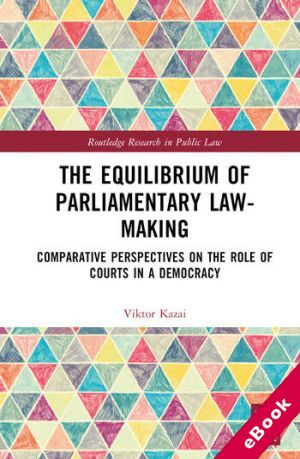We will be closed from 5pm Thursday 17th April for the Easter Bank Holidays, re-opening at 8.30am on Tuesday 22nd April. Any orders placed during this period will be processed when we re-open.

The device(s) you use to access the eBook content must be authorized with an Adobe ID before you download the product otherwise it will fail to register correctly.
For further information see https://www.wildy.com/ebook-formats
Once the order is confirmed an automated e-mail will be sent to you to allow you to download the eBook.
All eBooks are supplied firm sale and cannot be returned. If you believe there is a fault with your eBook then contact us on ebooks@wildy.com and we will help in resolving the issue. This does not affect your statutory rights.
This book is a response to the dangers posed to constitutional democracy by the continuous growth of executive power and the simultaneous decline of parliaments’ role in policy formation. These phenomena are often manifested in the manipulation and even the violation of the rules of parliamentary law-making, called irregularities. If left without consequences, these irregularities can ultimately lead to the elimination of the procedural constraints imposed on the ruling political forces to prevent their arbitrary exercise of power.
This work investigates the constitutional significance of the irregularities of parliamentary law-making and explores the role that courts play in the remedy of these flaws. The analysis is premised on the concept of equilibrium. This explanatory concept denotes an ideal state in which parliamentary law-making complies with the requirements of constitutionalism, and judicial review is conceptualized as a mechanism suitable to achieve this aim. The volume places the judicial review of the regulation and the practice of parliamentary law-making at its centre and discusses all the relevant legal concepts, institutions and doctrines. It combines theoretical analysis with case-law-centered comparative research covering a large number of decisions delivered by apex courts operating in various jurisdictions.
Due to this methodological choice, the book aims to simultaneously contribute to the scholarly discourse and provide useful information to practicing lawyers and policy makers working in the areas of Constitutional Law and Politics and Comparative Law.